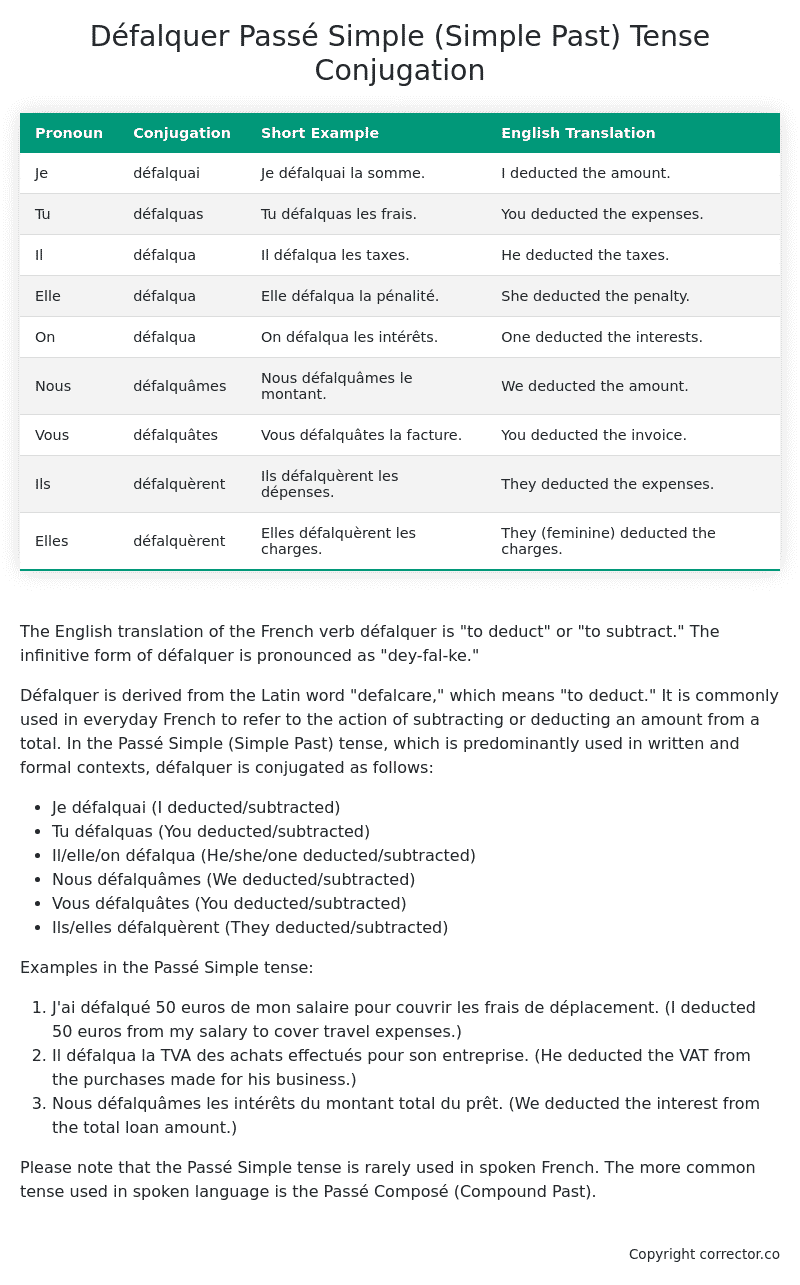Passé Simple (Simple Past) Tense Conjugation of the French Verb défalquer
Introduction to the verb défalquer
The English translation of the French verb défalquer is “to deduct” or “to subtract.” The infinitive form of défalquer is pronounced as “dey-fal-ke.”
Défalquer is derived from the Latin word “defalcare,” which means “to deduct.” It is commonly used in everyday French to refer to the action of subtracting or deducting an amount from a total. In the Passé Simple (Simple Past) tense, which is predominantly used in written and formal contexts, défalquer is conjugated as follows:
- Je défalquai (I deducted/subtracted)
- Tu défalquas (You deducted/subtracted)
- Il/elle/on défalqua (He/she/one deducted/subtracted)
- Nous défalquâmes (We deducted/subtracted)
- Vous défalquâtes (You deducted/subtracted)
- Ils/elles défalquèrent (They deducted/subtracted)
Examples in the Passé Simple tense:
- J’ai défalqué 50 euros de mon salaire pour couvrir les frais de déplacement. (I deducted 50 euros from my salary to cover travel expenses.)
- Il défalqua la TVA des achats effectués pour son entreprise. (He deducted the VAT from the purchases made for his business.)
- Nous défalquâmes les intérêts du montant total du prêt. (We deducted the interest from the total loan amount.)
Please note that the Passé Simple tense is rarely used in spoken French. The more common tense used in spoken language is the Passé Composé (Compound Past).
Table of the Passé Simple (Simple Past) Tense Conjugation of défalquer
| Pronoun | Conjugation | Short Example | English Translation |
|---|---|---|---|
| Je | défalquai | Je défalquai la somme. | I deducted the amount. |
| Tu | défalquas | Tu défalquas les frais. | You deducted the expenses. |
| Il | défalqua | Il défalqua les taxes. | He deducted the taxes. |
| Elle | défalqua | Elle défalqua la pénalité. | She deducted the penalty. |
| On | défalqua | On défalqua les intérêts. | One deducted the interests. |
| Nous | défalquâmes | Nous défalquâmes le montant. | We deducted the amount. |
| Vous | défalquâtes | Vous défalquâtes la facture. | You deducted the invoice. |
| Ils | défalquèrent | Ils défalquèrent les dépenses. | They deducted the expenses. |
| Elles | défalquèrent | Elles défalquèrent les charges. | They (feminine) deducted the charges. |
Other Conjugations for Défalquer.
Le Present (Present Tense) Conjugation of the French Verb défalquer
Imparfait (Imperfect) Tense Conjugation of the French Verb défalquer
Passé Simple (Simple Past) Tense Conjugation of the French Verb défalquer (You’re reading it right now!)
Passé Composé (Present Perfect) Tense Conjugation of the French Verb défalquer
Futur Simple (Simple Future) Tense Conjugation of the French Verb défalquer
Futur Proche (Near Future) Tense Conjugation of the French Verb défalquer
Plus-que-parfait (Pluperfect) Tense Conjugation of the French Verb défalquer
Passé Antérieur (Past Anterior) Tense Conjugation of the French Verb défalquer
Futur Antérieur (Future Anterior) Tense Conjugation of the French Verb défalquer
Subjonctif Présent (Subjunctive Present) Tense Conjugation of the French Verb défalquer
Subjonctif Passé (Subjunctive Past) Tense Conjugation of the French Verb défalquer
Subjonctif Imparfait (Subjunctive Imperfect) Tense Conjugation of the French Verb défalquer
Subjonctif Plus-que-parfait (Subjunctive Pluperfect) Tense Conjugation of the French Verb défalquer
Conditionnel Présent (Conditional Present) Tense Conjugation of the French Verb défalquer
Conditionnel Passé (Conditional Past) Tense Conjugation of the French Verb défalquer
Conditionnel Passé II (Conditional Past II) Tense Conjugation of the French Verb défalquer
L’impératif Présent (Imperative Present) Tense Conjugation of the French Verb défalquer
L’impératif Passé (Imperative Past) Tense Conjugation of the French Verb défalquer
L’infinitif Présent (Infinitive Present) Tense Conjugation of the French Verb défalquer
L’infinitif Passé (Infinitive Past) Tense Conjugation of the French Verb défalquer
Le Participe Présent (Present Participle) Tense Conjugation of the French Verb défalquer
Le Participe Passé (Past Participle) Tense Conjugation of the French Verb défalquer
Struggling with French verbs or the language in general? Why not use our free French Grammar Checker – no registration required!
Get a FREE Download Study Sheet of this Conjugation 🔥
Simply right click the image below, click “save image” and get your free reference for the défalquer Passé Simple tense conjugation!

Défalquer – About the French Passé Simple (Simple Past) Tense
Formation
Usage
Narration
Historical Context
Interactions with other tenses
Passé Composé
Imparfait
Conditional and Subjunctive
Summary
I hope you enjoyed this article on the verb défalquer. Still in a learning mood? Check out another TOTALLY random French verb conjugation!


